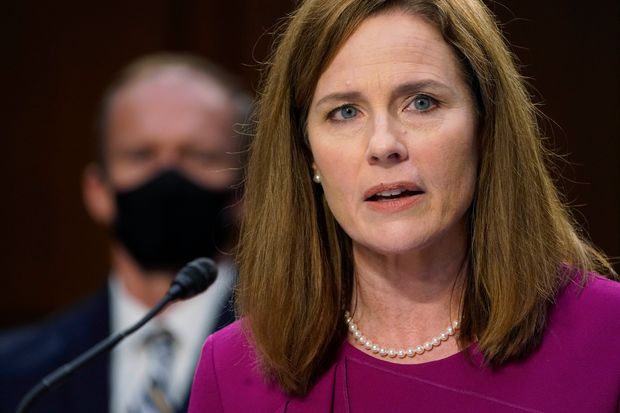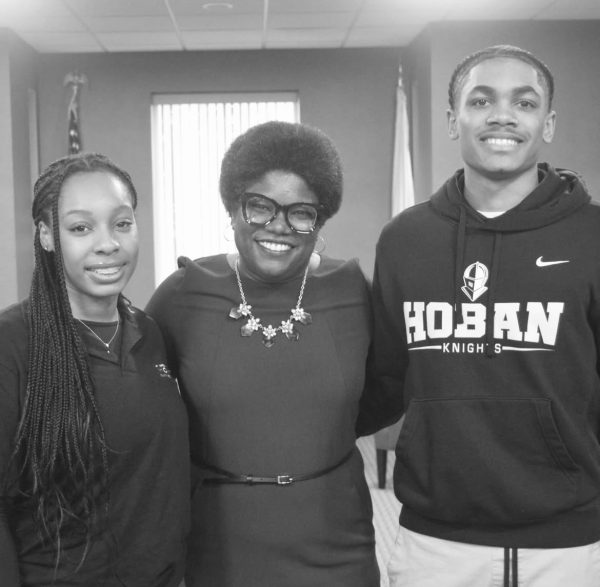Amy Coney Barrett hearings underway
Ruth Bader Ginsburg’s untimely death on Sept. 19 sent shockwaves of mourning and uncertainty throughout the country. Her passing not only means the loss of a champion for women’s rights but a vacant seat on the US Supreme Court as well. This latter point has become one heavily contested over the past two weeks as officials from both sides of the aisle argue their case for the nomination and confirmation of a new justice.
On Saturday, President Trump put forth former Notre Dame Law Professor and 7th Circuit Appeals Judge Amy Coney Barrett as his nominee, hoping Senator Mitch McConnell will deliver on his promise of a confirmation vote prior to election day. The rapidity of this nomination process has never been seen before–certainly not this close to the national election.
Senate democrats and presidential nominee Joe Biden alike argue the American people should have a say in the decision. A poll taken by the Washington Post shows 51 percent of Americans believe the winner of the presidency should make the selection so the people may have a say. Even strong republican senators like Susan Collins and Lisa Murkowski claim they will vote against Barrett if called before election day.
With a 47-53 minority–even if Sen. Collins and Murkowski flip–Senate Democrats will be hard pressed to win this battle. However, it will not be an easy go for Judge Barrett as she will undergo four consecutive days of questioning in front of the Senate Judiciary Committee. If the US has learned anything from Justice Brett Cavanugh’s hearing, anything and everything can be used against a nominee.
So before Amy Coney Barrett faces the collective scrutiny of the committee and media alike, here’s the run down of her personal and professional career:
Education and Academic Career:
Amy Coney Barrett’s time as a scholar resonates in the decisions made in her short time on the 7th Circuit Appeals bench. She first attended Rhodes College earning a bachelor’s degree in English and was chosen as the college’s most outstanding English graduate.
She then went on to Notre Dame Law, receiving high honors like the Hoynes Prize and placing first among her classmates. In addition to her dedication to her degree work, she served as the executive editor of the Notre Dame Law Review.
Her academic achievements did not end with a degree. Barrett has been a professor at Notre Dame Law School since 2002 and served as a visiting professor to institutions like George Washington University and the University of Virginia. Her legal opinions have also been published in prestigious journals such as The Columbia Law Reviews.
Despite the discrepancies between legal opinions, the New York Times cites that she has earned “praise from her colleagues as an astute scholar and jurist even if they did not always agree on her jurisprudential premises.”
Law Career and Record:
Judge Barrett’s law career poses many of the same defining qualities of her educational journey. The Times cites Case Western Reserve law professor Jonathan H. Adler as a witness to Barrett’s skill, finding that “As a scholar and a judge, she has shown herself to be a very careful and deliberate thinker who is concerned with getting the right answer.”
After graduation, Barrett would find herself in Washington DC where she clerked for Justice Antonin Scalia learned to become a constitution-minded judge. Her views as an originalist thinker cause her to rule on the side true to the founding principles of the US.
In 2017, President Trump nominated Judge Barrett for the 7th Circuit Court of Appeals. After successfully securing the confirmation, Barrett continued her practice of remaining true to the Constitution and her faith-based beliefs. AP News cites many of her more pronounced rulings including those pertaining to abortion and sexual assult. Though many of her decisions appear controversial, Barrett claims to follow Supreme Court precedent on most matters. In any case, Barrett’s impressive, consistent record in such a short tenure on the Appeals Court makes her a worthwhile nominee regardless of current circumstance.
Faith and Family
Despite the demands of her career, Barrett and her husband love and care for seven children. Of them, two were adopted from Haiti and one born with Down syndrome. She actively participates in her children’s lives and educates them in the faith.
The highly contested issue of Barrett’s Catholic beliefs have caused many in the media to criticize her impartiality as a judge. While sitting before the Judicial committee in 2017, Sen. Dianne Feinstein openly attempted to discredit her rulings because of it.
Many of Barrett’s rulings on the Appeals court do tend to lend towards conservative-Christian ideals. However, these instilled values go in turn with her devotion to the Constitution, creating a combination that rules on the side of the good and just.
“If you can keep in mind that your fundamental purpose in life is not to be a lawyer, but to know, love and serve God, you truly will be a different kind of person” Barrett says. The question of faith’s role in her rulings should not be one that alienates her, but rather bring hope for the future of a brighter, more prosperous America.
Judge Amy Coney Barrett would bring a unique perspective to the US Supreme Court regardless of the nature of her nomination. As a fellow member of Holy Cross tradition, she teaches that even in spite of career struggles and strife, faith guides and grants peace to those who stay true to it.


